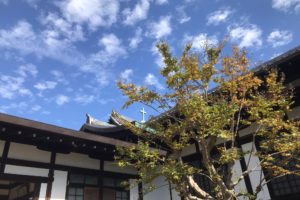June 18, 2023 Proper 6, Year A
Donald Seekins
Original Sin: Can We Re-Enter the Garden of Eden?
The Apostle Paul writes about the Christian concept of Original Sin in the fifth chapter of his Letter to the Romans, one of today’s readings: “While we were yet helpless, at the right time Christ died for the ungodly. Why, one will hardly die for a righteous man – though perhaps for a good man one will dare even to die. But God showed his love for us in that while we were yet sinners Christ died for us. Since, therefore, we are now justified by his blood, much more shall we be saved by him from the wrath of God. For if while we were enemies we were reconciled to God by the death of his Son, much more, now that we are reconciled, shall we be saved by his life” (Romans, 5: 6-10).
The fifth century A.D. theologian Saint Augustine writes extensively on Original Sin in his The City of God, especially the thirteenth book in which he argues that “it is taught that death is penal [punitive], and had its origin in Adam’s sin.” Adam and Eve’s defiance of God and their exercise of free will led to God permanently expelling them from the Garden of Evil into a harsh world – our world – burdened by suffering and death. This sin, representing a fundamental alienation of humanity from God, is only lifted from humanity’s shoulders by Jesus’ sacrifice on the Cross, which Paul also describes as a reconciliation between mankind and his/her Creator.
When I was teaching at a university in Okinawa over a decade ago, one of my close colleagues was a professor of English literature. An Okinawan, he was one of the earliest recipients of a scholarship to study at a university in the United States after World War II. While living in the States, he developed a great interest in Christianity. Although he didn’t become a Christian himself, he was fascinated by the influence of Christianity on western, especially English, literature.
Just before I retired from the university, he commented that he always felt that Eastern cultures were deficient, compared to Christianity, in one important aspect: they couldn’t fully account for the evil human beings do. He had witnessed the horrors of war as an adolescent during the Battle of Okinawa in 1945, in which over a third of the civilian population lost their lives.
I have thought a lot about his comment over the years since: with our world seeming to collapse into disorder and chaos, why are people so selfish, so arrogant, so short-sighted? So lacking in feelings of compassion towards others? Why do people always make the same mistakes over and over again? Like the American invasions of Afghanistan and Iraq, just four decades after the beginning of the Vietnam War?
While the 18th century Enlightenment in the West called into question many religious orthodoxies, including the doctrine of original sin, the horrors of the 20th century, including the mass murder of millions of innocents during World War II, have called into question the Enlightenment claim that progress has made people more decent, more humane, more aware of the links that we share with other humans. The 20th century, in fact, gave us ample evidence that despite our veneer of “civilization,” human history can still be described by the old Latin phrase: homo homini lupus (“man is a wolf to man” – which actually may do a disservice to wolves). In other words, man is marked by Original Sin.
My former colleague was making a critique of Confucianism, which has formed the foundation of ethical and social thought in East Asia for as long as two and a half millennia. Apart from Confucius himself (Kong Zi, 551-479 B.C.), the most important Confucian philosopher is Mencius (Meng Zi, 372-289 B.C.), whose work the Book of Mencius forms the core of Confucianist orthodoxy not only in China, but in Japan and Korea. The influence of Confucianism in these East Asian countries is still very strong today. Mencius proposed that human nature is good because of mankind’s internal moral sense: the sense of compassion, for example, is not taught to us by our parents or schools but exists already inside us. In The Book of Mencius, the philosopher says: “when left to follow its natural feelings human nature will do good. This is why I say it is good. If it becomes evil, it is not the fault of man’s original capability. The sense of mercy . . . The sense of shame . . . the sense of respect is found in all men; the sense of right and wrong is found in all men.” Philosophers often call this type of argument emotivism: morality is not a rational thing, but a product of our emotions, our feelings, which are “natural.”
In Confucianism, man is part of the natural order, which in its entirety strives for order and harmony. Confucian writings are full of descriptions of persons and acts deemed immoral, including the oppression of the poor by the rich and the just by the unjust, but the ethical way of the chuntzu, the cultured “gentleman,” is understood not as a commitment – assumed freely by the individual – to a moral way of life as it is conformity to certain ideals of self-development, which brings him (very rarely her) in line with the nourishing and peaceful harmony of the Cosmos. Moreover, man is seen as dwelling wholly within a natural order defined by the trinity of Heaven, Earth and Man. Heaven (天 tian) in ancient China might have been depicted as a supreme god, but over time it became an impersonal natural order. “Tian does not speak,” the Confucianists say. The sages of Confucianism are not prophets, who bring the word of God to humans, but antiquarians who find ultimate truth in the customs of an idealized past. Proper performance of “rites and ceremonies” (li in Chinese) seamlessly connects mankind with the harmonious and perpetual workings of an orderly Cosmos.
The linking of Heaven-Earth-Man is seen in the Chinese character for “king,” wang (王): wangdao (王道) is the just and legitimate “way of the king,” the central pillar which ties together the different levels of nature. In contrast, padao (覇道) is the way of the hegemon, the tyrant, who rules through brute force alone. Thus, in Confucianism the political and social order is neither decreed by a supreme God (like the God of the Ten Commandments) nor based upon the self-interest of competitive individuals who wish to escape the anarchic state of nature (as in the Leviathan of the 17th century English philosopher Thomas Hobbes), but is a fully natural phenomenon.
The idea of li (礼, “rites, ceremonies”) is crucial. Westerners usually consider such things to be artificial, contrived, often a cover for insincerity. However, li taken in the classical Confucian sense refers to practices which unite man with nature. As the philosopher Xunzi (third century B.C.) wrote:
“Li is that whereby Heaven and Earth unite, whereby the sun and moon are bright, whereby the four seasons are ordered, whereby the stars move in their courses . . . whereby all things prosper, whereby love and hatred are tempered, whereby joy and anger keep their proper place. It causes the lower orders to obey, and the upper orders to be illustrious; through myriad changes it prevents going astray. But if one departs from it, he will be destroyed. Is not li the greatest of all principles?”
In a sense, the ideal of the good Confucian society invites us to re-enter the Garden of Eden. As a product of the harmony of nature, it is perfect, or at least perfectible. As long as humans adhere to proper, hierarchical social relations, sustained by their naturally good qualities, they will not go astray. And the leaders of such a society – scholar-officials, meritocrats, technocrats – work tirelessly to make the people’s lives better and better.
To summarize, we could conclude that while in Christianity, doing bad stuff is a feature, not a bug, in Confucianism, doing bad stuff is a bug, not a feature.
The idea of the perfectibility of man is a familiar one: within our own memory, it has been promoted by the “workers’ state” of the Soviet Union, “socialism with Chinese characteristics” in the People’s Republic of China, and the “world’s happiest country” under the dynasty established by Kim Il-sung. Although they often do not have enough rice to eat, North Koreans are taught that they are “the most fortunate people in the world” under the rule of the benign Kim Dynasty. The promise of an earthly paradise has also has become the foundation of the ultra-commercialized, technocratic societies of the West and Japan. All of these societies can be considered attempts to re-enter the Garden of Eden.
When we think of Eden, we probably envision a place like a very expensive resort in the Maldives or the islands of Greece, with private bungalows, 24-hour butler service, spectacular views of the ocean, gourmet meals and all sorts of fascinating activities like diving, yoga or sail-boating. Or Dubai, where we can ski down a snowy slope while the temperature outside is 40 degrees C. It is a place where we don’t need to work, or deal with unpleasant or oppressive people. It’s a place where we, secretly, would like very much to be – especially when compared to the world where we actually live.
Most recently, revolutions in information technology and computer science are promising us an even newer and more novel Virtual Garden of Eden. Guided, or perhaps controlled, by Artificial Intelligence, we can live in vivid, sexy, enticing worlds that are more real than Reality itself. Or, at least more fun. The kind of fun that makes a resort in the Maldives seem dreary. Who wants to get all sweaty doing yoga when you can just sit and stare into you monitor, or your $3,500 Apple Super-goggles? This is a world so attractive that computer nerds or otaku actually fall in love with their inhabitants and ignore flesh-and-blood men and women.
However, one of the major themes in the history of Christianity has been the acknowledgement that mankind, created by God “in his image,” is not a part of nature, and indeed – through Original Sin – is radically alienated from it, as well as from God himself. Humans lack the “innocence” of nature, and are divorced from it, living in a world that we have largely created by ourselves. Though that doesn’t mean that we can ignore or disrespect nature and its power, as people like Greta Thunberg always tell us.
Nevertheless, the shimmering vision of some kind of Garden of Eden hovers over us like a luminous – and illusory – cloud. To take this vision seriously is to deny mankind’s problematic status and his alienation from God. Many people indeed take it seriously. Not only the Chinese sages who sketched a vision of man as an integral part of nature though his/her good nature, but revolutionaries who seek to create the perfect society and technocrats whose real ambitions seems to be to become gods themselves.














